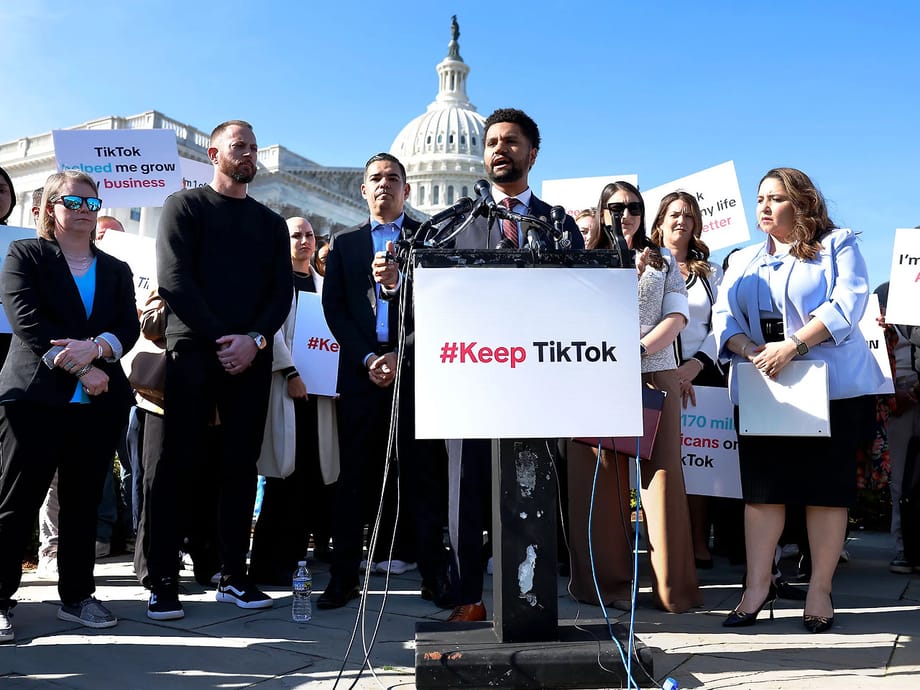This is an AI translated post.
The lessons of the TikTok ban, culture
- Writing language: Korean
- •
-
Base country: All countries
- •
- Entertainment
Select Language
Summarized by durumis AI
- The U.S. Congress has passed legislation forcing ByteDance, the parent company of TikTok, to sell its U.S. business within a year, but TikTok is pushing back, asking its 170 million U.S. users to protest to Congress.
- TikTok has become part of American culture, influencing various sectors such as music, entertainment, and marketing, and the voices of Americans opposed to the TikTok ban demonstrate TikTok’s cultural influence.
- The debate over this TikTok ban provides insights into how to view the cultural influence of platforms, and Korea should consider cultural influence when pursuing platform regulation.
A bill was passed in the US Congress on the 20th that would force ByteDance, the parent company of TikTok, to sell its US business to an American company within a year. On the same day, the House of Representatives passed a bill requiring ByteDance to sell its TikTok service in the US within 270 days by a vote of 360 to 58. TikTok protested that the bill was essentially a ban on TikTok as it would be difficult to close a sale within the time limit.
There have been persistent concerns within the US political circles and intelligence agencies that the Chinese government could access TikTok user data in the US, posing a threat to national security. In response, TikTok has sent notifications to its estimated 170 million US users, urging them to protest to Congress. These notifications included a feature that allowed users to search for their representative's number by entering their zip code. As a result, an average of 20 phone calls per minute were made, and some congressional offices temporarily shut down their phone lines.
Why are so many Americans actively opposing a potential ban on TikTok despite the justification of national security? This demonstrates that TikTok has become an integral part of American culture, highlighting the cultural significance and power within a society.
The New York Times published an article on the 18th, featuring 19 TikTok-related articles highlighting 19 ways in which this single app has transformed American culture. From the changing Hollywood movie marketing tactics, the rise of conspiracy theorists' content, and the removal of bathroom mirrors as a desperate measure by teenagers who frequently disappear from class to use TikTok, it clearly shows the presence of TikTok in various cultural changes, both big and small, across society.
TikTok's algorithm learns users' interests and preferences in real-time, boosting ordinary videos to garner millions of views. This has created a new type of influencer, known as "micro-celebrities," who gained fame within a short period due to their focus on specific topics. TikTok has also influenced the overall success formula in the music industry, making it a necessity to create viral challenge videos, as songs that start on TikTok dominate the charts. Taylor Swift recently made a bold decision to post her new song on TikTok, ending her contract with Universal Music Group due to low royalty payments. This change is possible because TikTok's rapid content cycle and algorithm accelerate trend cycles in American society, reshaping the flow of American culture.
From a cultural conquest standpoint, the US Congress's forced sale bill for TikTok can be seen as a failed attempt. Historically, cultural invasions have had a significant impact on society. The Roman Empire imposed Roman laws, technology, and infrastructure alongside military conquests, transforming local cultures. Nazi Germany destroyed cultural heritage to erase the history and identity of a region.
Culture is already existing. Therefore, the forceful implementation of this bill related to the TikTok ban is unlikely to yield significant gains, contrary to the US Congress's expectations. TikTok has already successfully integrated itself into the core roles of music, entertainment, marketing, politics, and fashion in the US, influencing various fields. As a result, we can see that the signs held by Americans opposing the TikTok ban are filled with words like "keep," "grow," "business," "life," and "change," evoking feelings of sustenance and prosperity.
In other words, the question that should have been asked to Americans first was, "What is TikTok?"

I understand that regulations are being pursued against large platform companies such as Naver and Kakao in Korea. Considering the significant influence these services have on users' daily lives and culture, it seems necessary to incorporate the cultural impact into the process of refining these regulations, along with the market-centric perspective.
Margaret Mead, considered a great 20th-century anthropologist, described understanding and respecting culture as "essential for social change and peaceful coexistence." The debate over this TikTok ban bill provides insights for Korea on how to approach the interplay between platforms and culture.
References





